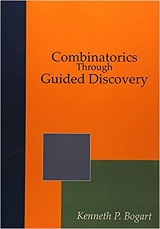
|
FreeComputerBooks.com
Links to Free Computer, Mathematics, Technical Books all over the World
|
|
- Title: Combinatorics Through Guided Discovery
- Author(s) Kenneth P. Bogart
- Publisher: CreateSpace (December 14, 2017); eBook (GNU Free Documentation Licensed)
- License(s): GNU Free Documentation License
- Hardcover/Paperback: 220 pages
- eBook: HTML, PDF (220 pages), ePub, Kindle, Text, Daisy, Divu, etc.
- Language: English
- ISBN-10: 1981746595
- ISBN-13: 978-1981746590
- Share This:

|
This book is an introduction to combinatorial mathematics, also known as combinatorics. The book focuses especially but not exclusively on the part of combinatorics that mathematicians refer to as 'counting'.
The book consists almost entirely of problems. Some of the problems are designed to lead you to think about a concept, others are designed to help you figure out a concept and state a theorem about it, while still others ask you to prove the theorem.
Other problems give you a chance to use a theorem you have proved. From time to time there is a discussion that pulls together some of the things you have learned or introduces a new idea for you to work with. Many of the problems are designed to build up your intuition for how combinatorial mathematics works.
There are problems that some people will solve quickly, and there are problems that will take days of thought for everyone. Probably the best way to use this book is to work on a problem until you feel you are not making progress and then go on to the next one.
The content of the published version is nearly identical to the 2004 release, save for a few typographical corrections.
About the Authors- Kenneth P. Bogart was an American mathematician known for his work on preference structures and for his textbook on combinatorics. He was a professor at Dartmouth College. Before his death in 2005, Ken Bogart was in the final stages of completing an NSF-sponsored project about the teaching of combinatorics through Guided Discovery.

- Combinatorics Through Guided Discovery (Kenneth P. Bogart)
- The Mirror Site (1) - PDF, ePub, Kindle, etc.
- The Mirror Site (2) - PDF
- Enumerative Combinatorics Through Guided Discovery (Kenneth P. Bogart)
-
 Combinatorics (Joy Morris)
Combinatorics (Joy Morris)
Emphasizes combinatorial ideas including the pigeon-hole principle, counting techniques, permutations and combinations, Pólya counting, binomial coefficients, inclusion-exclusion principle, generating functions and recurrence relations, and combinatortial structures.
-
 Introduction to Ramsey Theory (Veselin Jungic)
Introduction to Ramsey Theory (Veselin Jungic)
This book serves as a gentle introduction to Ramsey Theory for readers interested in becoming familiar with a dynamic segment of contemporary mathematics that combines ideas from number theory and combinatorics.
-
 Applied Combinatorics (Mitchel T. Keller, et al)
Applied Combinatorics (Mitchel T. Keller, et al)
This is a text with more than enough material for a one-semester introduction to combinatorics. The original target audience was primarily computer science majors, but the topics included make it suitable for a variety of different students.
-
 Analytic Combinatorics (Philippe Flajolet, et al)
Analytic Combinatorics (Philippe Flajolet, et al)
The definitive treatment of analytic combinatorics. This self-contained text covers the mathematics underlying the analysis of discrete structures, with thorough treatment of a large number of applications.
-
 An Introduction to Combinatorics and Graph Theory
An Introduction to Combinatorics and Graph Theory
This book walks the reader through the classic parts of Combinatorics and graph theory, while also discussing some recent progress in the area: on the one hand, providing material that will help students learn the basic techniques.
-
 Foundations of Combinatorics with Applications (Edward Bender)
Foundations of Combinatorics with Applications (Edward Bender)
This introduction to combinatorics, the foundation of the interaction between computer science and mathematics, is suitable for upper-level undergraduates and graduate students in engineering, science, and mathematics.
-
 Combinatorial Theory (Gian-Carlo Rota, et al.)
Combinatorial Theory (Gian-Carlo Rota, et al.)
Everything you could possibly need to know about combinatorics is in this book. It is extremely clear, well-written, and there are plenty of examples that really help to connect the principles to real-world applications.
-
 Lists, Decisions and Graphs - With an Introduction to Probability
Lists, Decisions and Graphs - With an Introduction to Probability
In this book, four basic areas of discrete mathematics are presented: Counting and Listing (Unit CL), Functions (Unit Fn), Decision Trees and Recursion (Unit DT), and Basic Concepts in Graph Theory (Unit GT).
-
 Magic Squares and Cubes (William Symes Andrews)
Magic Squares and Cubes (William Symes Andrews)
This book cover topics such as magic squares, magic cubes, the Franklin squares, magics and Pythagorean numbers, the theory of reversions, magic circles, spheres, and stars, and magic octahedroids, among other things.
-
 Combinatorial Geometry with Application to Field Theory
Combinatorial Geometry with Application to Field Theory
Topics covered in this book include fundamental of combinatorics, algebraic combinatorics, topology with Smarandache geometry, combinatorial differential geometry, combinatorial Riemannian submanifolds, Lie multi-groups, etc.
-
 A=B, by Marko Petkovsek, Herbert S. Wilf, et al
A=B, by Marko Petkovsek, Herbert S. Wilf, et al
This book is of interest to mathematicians and computer scientists working in finite mathematics and combinatorics. It presents a breakthrough method for analyzing complex summations.
>





